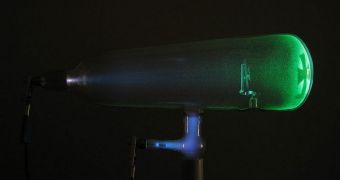A professor at the Princeton University has recently managed to eliminate one of the major hurdles plaguing the field of quantum computing, when he has developed a method of altering the properties of a single electron in a sea of other electrons. The finding is absolutely fundamental to developing the new, heavily investigated quantum computer, a machine that would have an amazing processing power and that would be capable of handling tasks that quickly become impossible to resolve even for the most powerful supercomputers in the world today. Electrons are believed to be one of the main candidates for setting the foundation of the basic unit in a quantum processor, the qubit (quantum bit).
What PU Assistant Professor of Physics Jason Petta demonstrated was basically a way of altering the properties of a single electron, without disturbing the trillions of electrons that existed around the target at all times. The method revolves around using “microscopic corrals,” which are nothing more than electron traps, made by applying voltages to minuscule electrodes. The devices capture only one or two electrons, and forces them to produce “spin qubits,” the quantum variation of regular computer bits.
Details of this amazing, new work appear in the February 5 issue of the top journal Science. Coauthors for the paper include University of California in Santa Barbara (UCSB) experts Art Gossard and Hong Lu. Unlike other techniques for controlling electrons, which relied on subjecting entire samples to the effects of radiation, the new method is very precise, and incredibly fast. According to Petta, it takes about one billionth of a second for the electrons to be forced into their spin qubit state.
“If you can take a small enough object like a single electron and isolate it well enough from external perturbations, then it will behave quantum mechanically for a long period of time. All we want is for the electron to just sit there and do what we tell it to do. But the outside world is sort of poking at it, and that process of the outside world poking at it causes it to lose its quantum mechanical nature,” the PU expert adds. “Our approach is really to look at the building blocks of the system, to think deeply about what the limitations are and what we can do to overcome them. But we are still at the level of just manipulating one or two quantum bits, and you really need hundreds to do something useful,” Petta concludes.

 14 DAY TRIAL //
14 DAY TRIAL //